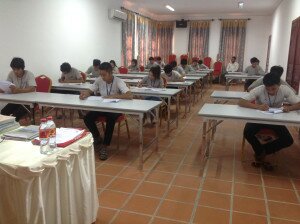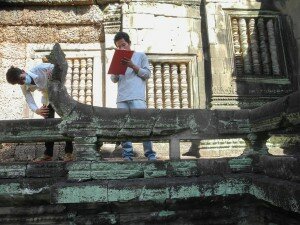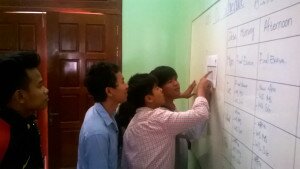
Final Exam
24 March 2015
Siem Reap, Cambodia – It was a special day for the 18 students of APSARA Stone Conservation Unit: After two years of intense training they were about to finish their studies with a final exam last Monday.
APSARA is the only Cambodian institution offering a vocational training programme to become a Stone Conservator in Cambodia. It addresses the urgent need for skilled conservators to safeguard the temples of Angkor and others located in remote areas. The programme puts the care of Cambodian heritage back into the hands of local people.
The design of the two-year training programme was based on the German vocational training system. The curriculum consists of theoretical lessons

Mapping at Banteay Samre
and guided practical work. Following the specially developed “Handbook Stone Conservation and Restoration in Angkor”, the students learned how to classify types of natural rocks; their cultural history; how to assess damage on decorated temple walls and how to treat them accordingly.
In the last four weeks of their training the students were very busy. Each student composed a condition and damage assessment report on a decorated part of a balustrade at Banteay Samre temple. After they handed in their final reports and the mappings, they had to defend their assessment in an oral exam. In a written test their knowledge and theoretical background was verified, while their practical performance was evaluated by the three local training supervisors.

Students are checking results
All students passed the exam with good results, and so the experts of Stone Conservation Unit are now looking forward to work together with 18 new colleagues.
The APSARA Authority announced that all students will be hired and will work either at the temples of Angkor or at other temples throughout the country. After finishing this multidisciplinary training program, 18 young Khmer are now facing a bright future and will contribute to the sustainable preservation of their own cultural heritage.
Congratulations!

